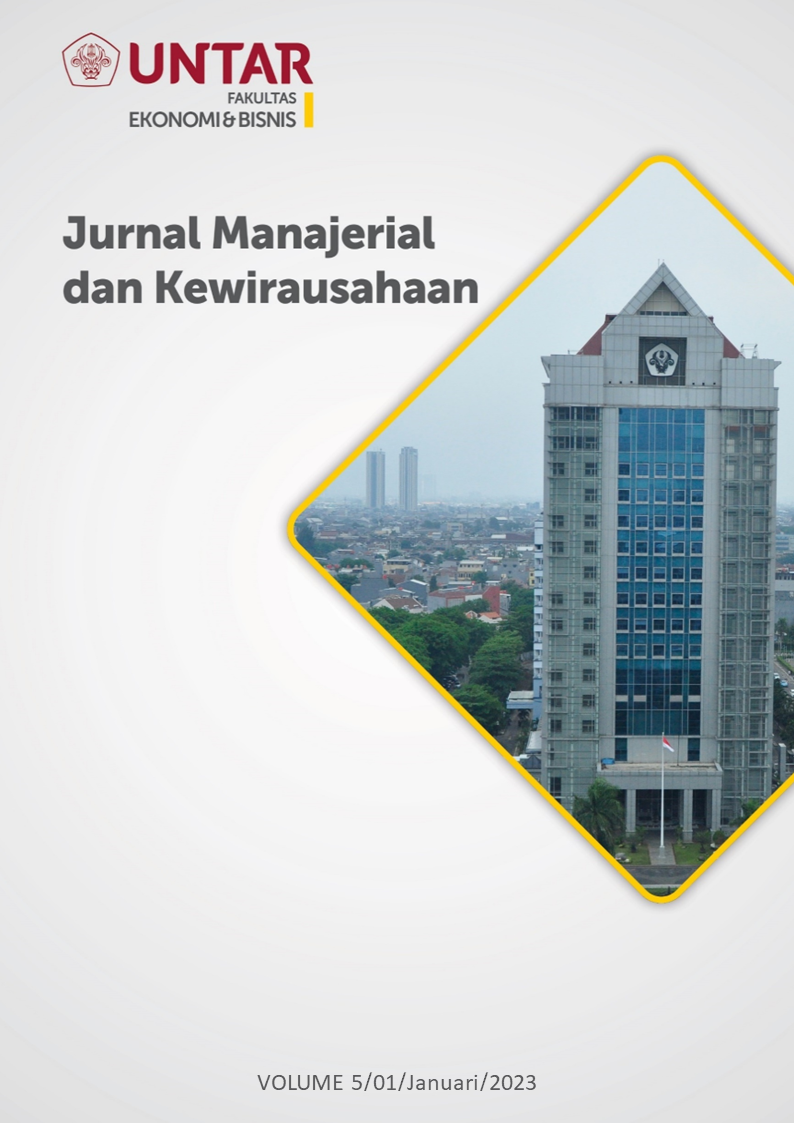Pengaruh Financial Behavior, Financial Knowledge, dan Financial Strain terhadap Financial Satisfaction
Main Article Content
Abstract
Tujuan dari penelitian ini adalah untuk menguji pengaruh Financial Behavior, Financial Knowledge, dan Financial Strain terhadap Financial Satisfaction. Sampel dalam penelitian ini adalah seluruh penduduk kota Medan yang sudah memiliki penghasilan. Sampel dipilih dengan menggunakan metode convenience sampling berjumlah 171 responden dengan menyebarkan kuesioner secara online melalui Google Form. Teknik analisis data yang digunakan adalah Structural Equation Modeling (SEM) yang dibantu dengan bantuan program Smart-PLS.3.3.3. Hasil penelitian ini adalah Financial Behavior dan Financial Knowledge memiliki pengaruh positif terhadap Financial Satisfaction, sedangkan Financial Strain tidak memiliki pengaruh terhadap Financial Satisfaction.
The purpose of this study is to examine the effect of Financial Behavior, Financial Knowledge, and Financial Strain on Financial Satisfaction. The sample in this study is all residents who already have income in Medan city. The sample was chosen using convenience sampling method amounted to 171 respondents by distributing questionnaires online through the Google form section. The data analysis technique used is Structural Equation Modeling (SEM) which is assisted with the assistance of the Smart-PLS program.3.3.3. The results of this study are that Financial Behavior and Financial Knowledge have a positive effect on Financial Satisfaction, meanwhile Financial Strain do not have effect on Financial Satisfaction.
Article Details
Section

This work is licensed under a Creative Commons Attribution-NonCommercial-ShareAlike 4.0 International License.
This work is licensed under a Jurnal Muara Ilmu Ekonomi dan Bisnis Creative Commons Attribution-ShareAlike 4.0 International License.,/p>
References
Ali, A., Rahman, M. S., & Bakar, A. (2013). Financial Literacy and Satisfaction in Malaysia: A Pilot Study. International Journal of Trade, Economics and Finance, 4(5), 319.
Amelia, M., & Isbanah, Y. (2021). Analisis Faktor-Faktor yang Memengaruhi Financial Satisfaction Pengguna E-Wallet. Jurnal Ilmu Manajemen, 9(2).
Asebedo, S. D., & Wilmarth, M. J. (2017). Does how we feel about Financial Strain matter for mental health?. Journal of Financial Therapy.
Austin, J. N., & Nuryasman, M. N. (2020). Perilaku, Sikap Dan Pengetahuan Keuangan Terhadap Kepuasan Keuangan. Jurnal Manajerial Dan Kewirausahaan, 3(1), 61-71. https://doi.org/10.24912/jmk.v3i1.11288
Bowen, C. F. (2002). Financial Knowledge of teens and their parents. Financial counseling and planning, 13(2), 93-102.
Çera, G., Khan, K. A., Belas, J., & Ribeiro, H. N. R. (2020). The role of financial capability and culture in Financial Satisfaction. Economic Papers: A journal of applied economics and policy, 39(4), 389-406.
Coşkuner, S. (2016). Understanding factors affecting Financial Satisfaction: The influence of Financial Behavior, Financial Knowledge and demographics. Imperial Journal of Interdisciplinary Research, 2(5), 377-385.
Darmawan, D., & Pamungkas, A. S. (2019). Pengaruh Financial Attitude, Financial Behavior, Dan Financial Knowledge Terhadap Financial Satisfaction. Jurnal Manajerial dan Kewirausahaan, 1(2), 172-181. https://doi.org/10.24912/jmk.v2i3.9575
Databoks, (2020) “Perekonomian Kota Medan Terbesar di Sumatera Utara” available at Perekonomian Kota Medan Terbesar di Sumatera Utara | Databoks (katadata.co.id)
Falahati, L., Sabri, M. F., & Paim, L. H. (2012). Assessment a model of Financial Satisfaction predictors: Examining the mediate effect of financial behaviour and Financial Strain. World Applied Sciences Journal, 20(2), 190-197.
Hasibuan, B. K., & Lubis, Y. M. (2017). Financial Satisfaction on Small and Medium Business in Brastagi City. In IOP Conference Series: Materials Science and Engineering (Vol. 180, No. 1, p. 012255). IOP Publishing.
Joo, S. H., & Grable, J. E. (2004). An exploratory framework of the determinants of Financial Satisfaction. Journal of family and economic Issues, 25(1), 25-50.
Mo, J. (2020). PISA 2018 results: Are students smart about money?.
OCBC NISP Financial Fitness Index 2021 “Sebuah Riset Untuk Generasi Indonesia Yang Lebih Sehat Finansial” available at Ruang meNYALA
Perry, V. G., & Morris, M. D. (2005). Who is in control? The role of self‐perception, knowledge, and income in explaining consumer Financial Behavior. Journal of consumer affairs, 39(2), 299-313.
Pratiwi, O. (2019). Pengaruh Financial Knowledge, Financial Behavior, Financial Efficacy & Risk Tolerance Terhadap Financial Satisfaction Pada Pegawai Pt. Bank Mandiri (Persero) Kantor Pusat, 1-11.
Sherlyani, M., & Pamungkas, A. S. (2020). Pengaruh Financial Behavior, Risk Tolerance, Dan Financial Strain Terhadap Financial Satisfaction. Jurnal Manajerial Dan Kewirausahaan, 2(1), 272-281. https://doi.org/10.24912/jmk.v2i1.7468
Wijaya, O. S., & Pamungkas, A. S. (2020). Pengaruh Financial Attitude, Financial Behavior, Financial Knowledge, dan Risk Tolerance terhadap Financial Satisfaction. Jurnal Manajerial Dan Kewirausahaan, 2(3), 631-642. https://doi.org/10.24912/jmk.v2i3.9575
Woodyard, A. S., & Robb, C. A. (2016). Consideration of Financial Satisfaction: What consumers know, feel and do from a financial perspective. Journal of Financial Therapy, 7(2), 4.

